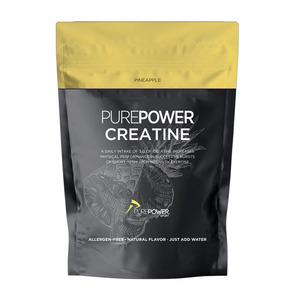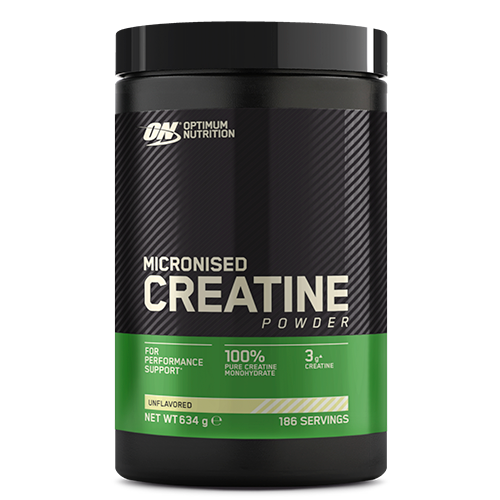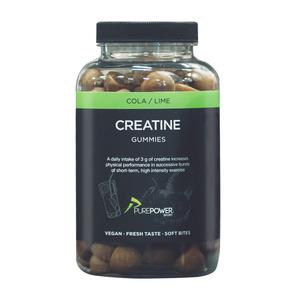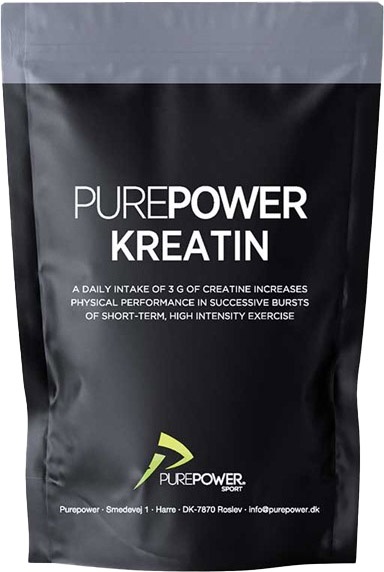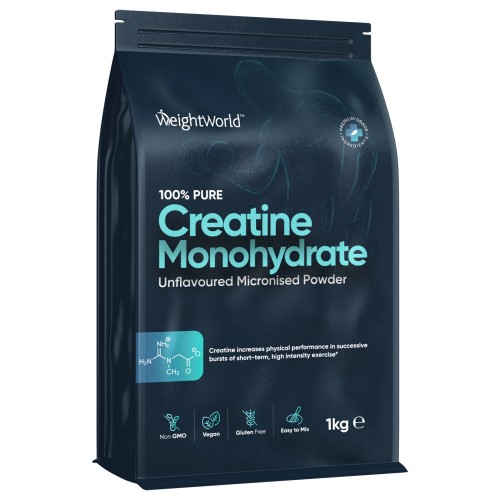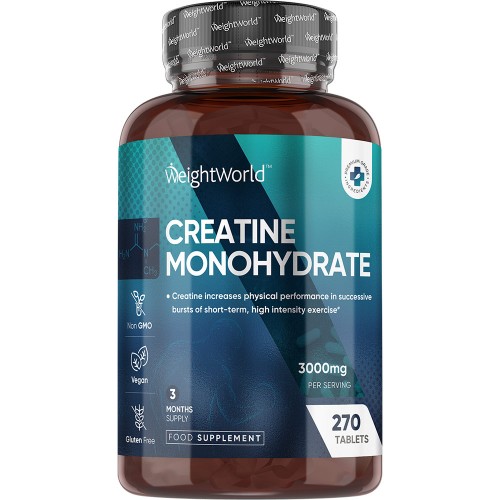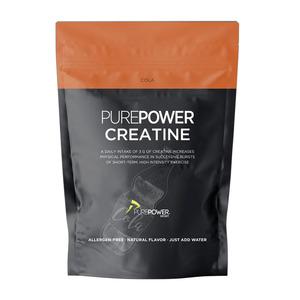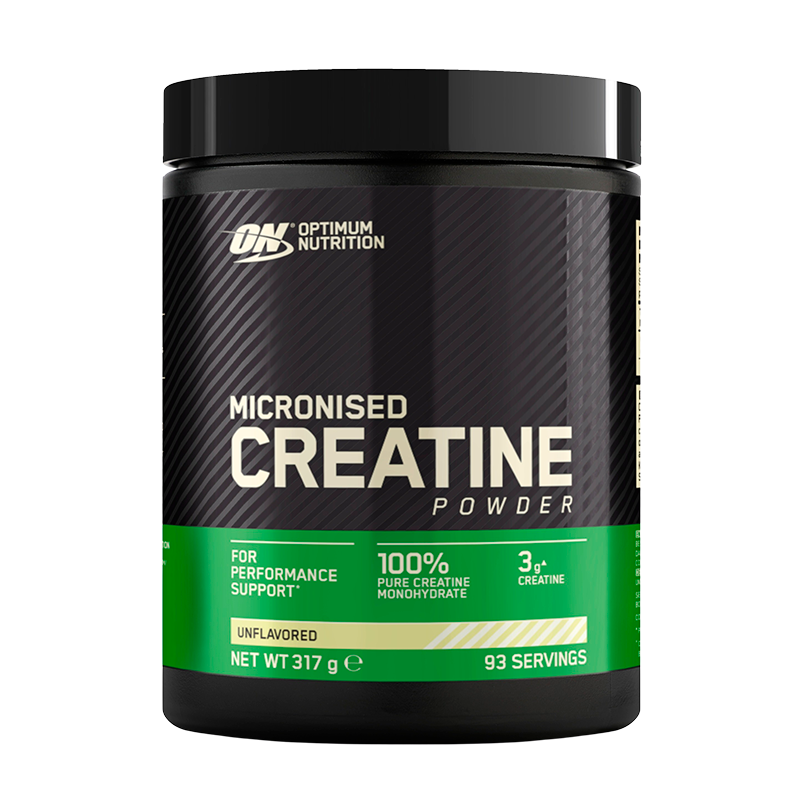En dybdegående viden om kreatiner
Velkommen til vores omfattende guide om kreatiner. Hvis du er en fitnessentusiast, der søger at optimere din træningspræstation, har du sandsynligvis hørt om kreativstofferens potentiale. I denne guide vil vi dykke dybere ned i alt, hvad du behøver at vide om kreatin.
Fra det grundlæggende til de mest avancerede anvendelser, vil vi sikre, at du har alle oplysninger til at træffe informerede beslutninger om, hvordan du bruger kreatiner på den mest effektive måde. Kreatiner er blevet populære blandt atleter og motionister som et supplement, der kan forbedre styrke, udholdenhed og muskelmasse. Men som med alle kosttilskud er der også meget at overveje, herunder potentielle bivirkninger og hvordan man vælger det bedste produkt på markedet.
Oversigt over guidenFor at gøre navigationen igennem vores omfattende guide lettere, har vi opdelt informationerne i flere nøgleafsnit. Her er en kort oversigt over, hvad du kan forvente:
- Grundlæggende Definition af Kreatiner: Vi begynder med de fundamentale aspekter, hvad kreatiner er, og hvordan de biologisk fungerer.
- Kreatinbrug: En Vejledning: En trin-for-trin guide til korrekt dosering og anvendelse.
- Fordele ved Kreatiner: Her kigger vi på forskning og dokumenterede fordele ved at bruge kreatintilskud.
- Ulemper og Potentielle Bivirkninger: En ærlig gennemgang af hvad du skal være opmærksom på for at undgå uønskede bivirkninger.
- Hvordan Man Vælger det Rette Kreatinprodukt: Markedet er fyldt med forskellige kreatinprodukter, vi hjælper dig med at vælge det rigtige.
- Prisoversigt over Kreatiner: En sammenligning af priser på tværs af forskellige mærker og typer af kreatin.
- Alternativer til Kreatin: Er kreatin ikke noget for dig? Vi ser på mulige alternativer, du kan overveje.
- Kreatin Vedligeholdelse og Opbevaring: Tips til korrekt opbevaring for at sikre produktets effektivitet.
- Overvejelser om Variationer i Størrelser og Materialer: Hvordan forskellige former og formler påvirker effektivitet og brugervennlighed.
- Almindelige Fejl at Undgå med Kreatin: Undgå de mest almindelige faldgruber, folk løber ind i med kreatinbrug.
- Tips og Tricks til Optimal Brug af Kreatin: Hemmelighederne til at få mest ud af dit kreatintilskud.
- Avancerede Anvendelser af Kreatin: Fordybelse i de mest avancerede teknikker og anvendelsesområder af kreatiner.
Målet med denne guide er at give dig en fuldt dækkende viden om kreatiner, fra deres grundlæggende egenskaber og fordele til de mere tekniske og avancerede anvendelser. Vores tilgang er faktabaseret og omhyggeligt undersøgt, så du kan stole på de oplysninger, du finder her. Læs videre for at opdage alt, hvad der er værd at vide om kreatiner!
Grundlæggende definition af kreatiner
Kreatin er et af de mest populære kosttilskud blandt atleter og fitnessentusiaster. Dets effektivitet i at øge muskelmasse, styrke og ydeevne har gjort det til et uundværligt element i træningsrutiner verden over. Denne sektion giver en omfattende introduktion til, hvad kreatin er, de forskellige typer der findes, og hvordan det virker i kroppen.
Hvad er kreatin?
Kreatin er en naturlig forbindelse, som findes i små mængder i fødevarer som kød og fisk, og det syntetiseres også i menneskekroppen. Det største lager af kreatin findes i musklerne, hvor det spiller en nøglerolle i produktionen af energi.
Biokemisk set er kreatin sammensat af tre aminosyrer:
- Arginin
- Glycin
- Methionin
Disse aminosyrer danner tilsammen kreatin, som derefter omdannes til kreatinfosfat. Denne form er vigtig for hurtige energikilder, især under kortvarige, højintensive aktiviteter som sprint eller vægtløftning.
Forskellige typer af kreatiner
For at få mest muligt ud af kreatin som kosttilskud, er det vigtigt at kende de forskellige typer, der findes på markedet. Her er nogle af de mest almindelige:
- Kreatin Monohydrat: Den mest almindelige og velstuderede form for kreatin. Det er yderst effektivt og har en høj biotilgængelighed.
- Kreatin Etyl Ester: Denne type hævdes at have bedre absorption end monohydrat, men der er mindre forskning til at understøtte dette.
- Kre-Alkalyn: En pH-bufferet form af kreatin, der siges at reducere den mavebesvær, som nogle oplever.
- Kreatin Hydrochlorid: En form for kreatin, der er opløselig i vand, hvilket kan øge absorptionen.
- Buffered Kreatin: Dette kreatin har en buffer, der forhindrer omdannelse til kreatinin, hvilket kan forbedre effektiviteten.
Hver type har sine egne fordele og potentielle ulemper, og det kan være nødvendigt at eksperimentere for at finde den type, der passer bedst til dine behov.
Hvordan kreatin fungerer i kroppen
Kreatins primære funktion i kroppen er at hjælpe med at producere ATP (adenosintrifosfat), som er den primære energikilde for celler. Her er en grundlæggende forståelse af, hvordan kreatin fungerer:
Når du udfører en højintensiv aktivitet, såsom vægtløftning, nedbrydes ATP til ADP (adenosindifosfat) for at frigive energi. Kreatinphosphat i musklerne omdannes hurtigt til ATP, hvilket giver en ekstra energikilde til at opretholde intensiteten af aktiviteten.
- Kreatin øger det totale kreatinindhold i musklerne, som inkluderer både kreatin og kreatinphosphat.
- Det hjælper med hurtigere regenerering af ATP, hvilket giver mulighed for længere og mere intensive træningssessioner.
- Kreatin øger også muskelcellevolumen ved at trække vand ind i musklerne, hvilket kan fremme muskelvækst.
Yderligere forskning har også vist, at kreatin kan have neurobeskyttende egenskaber og kan hjælpe med kognitive funktioner.
Samlet set giver denne sektion en grundlæggende definition af kreatin, de forskellige former det findes i, og hvordan det virker i kroppen. Dette er en kritisk del af forståelsen for dem, der overvejer at inkorporere kreatin som en del af deres kosttilskudsrutine.
Grundlæggende brug og doseringsveje
Kreatin er et af de mest anvendte kosttilskud i fitnessverdenen på grund af dets dokumenterede effekt på muskelvækst og præstationsforbedring. Men for at opnå de bedste resultater, er det essentielt at forstå, hvordan man korrekt bruger og doserer dette tilskud.
Standarddosis: En typisk vedligeholdelsesdosis ligger på omkring 3-5 gram kreatin monohydrat om dagen. Dette er tilstrækkeligt for de fleste atleter og fitnessentusiaster til at vedligeholde øgede kreatinniveauer i musklerne.
Opladningsfase: Nogle vælger at starte med en opladningsfase, hvor man tager 20 gram kreatin dagligt fordelt over 4 doser i 5-7 dage. Dette kan hurtigt mætte musklerne med kreatin, hvorefter man går over til vedligeholdelsesdosen.
Doseringsveje kan variere afhængigt af typen af kreatin, individuelle mål og kropsvægt. Det er altid en god ide at følge producentens anvisninger og konsultere en sundhedsfaglig person, før man begynder på en kreatinkur.
Anbefalinger for nybegyndere
For dem, der er nye til kreatintilskud, er det vigtigt at gå trinvist frem for at undgå eventuelle ubehagelige bivirkninger og for at sikre kroppens tilpasning. Her er nogle praktiske tips til begyndere:
- Start langsomt: Begynd med en lavere dosis, f.eks. 3 gram dagligt i den første uge, og øg derefter gradvist til den anbefalede dosis.
- Bland med væske: Kreatin bør altid opløses i vand eller juice for bedre absorption og for at minimere risikoen for mavebesvær.
- Hold det simpelt: Vælg en simpel kreatin monohydrat-pulver til at starte med, da det er den mest undersøgte og effektive form.
- Hydration: Sørg for at drikke rigeligt med vand, da kreatin kan øge kravet på hydrering i musklerne.
Avancerede anvendelsesmetoder
Efterhånden som man bliver mere erfaren med kreatinbrug, kan man eksperimentere med avancerede metoder for at maksimere fordelene. Her er nogle populære teknikker:
- Periodisk cykling: Nogle atleter vælger at cykle kreatinbrug ved at tage det i perioder (8-12 uger) efterfulgt af en pause (4-6 uger), for at optimere responsen og minimere væskeophobning.
- Stakket kreatin: Kreatin kan kombineres (stakkes) med andre kosttilskud som beta-alanin, BCAA, og pre-workout for at forbedre den samlede effekt på muskelvækst og præstation.
- Tidskoordineret dosering: Nogle finder det mest effektivt at tage kreatin umiddelbart før eller efter træning for at udnytte de øgede blodgennemstrømninger i musklerne.
- Avancerede former for kreatin: Udover kreatin monohydrat kan erfarne brugere eksperimentere med andre typer som kreatin HCL eller kreatin ethyl ester, som kan have fordele ved bedre opløselighed og absorption.
Husk altid at lytte til din krop og justere doseringen efter dine individuelle behov og reaktioner.
Med den rette brug og dosering kan kreatin være et kraftfuldt redskab til at forbedre din træning og nå dine fitnessmål. Uanset om du er nybegynder eller erfaren bruger, er det vigtigt at være informeret og ansvarsfuld i din tilgang til dette kraftfulde supplement.
Fordele ved kreatiner
Denne sektion udforsker de mange fordele ved at bruge kreatin, fra øget muskelmasse til forbedret sportsprestation. Kreatin er et af de mest populære og veldokumenterede kosttilskud inden for træning og fitness. Dets anvendelse går langt ud over blot muskelopbygning, og fordelene er mange.
Øget muskelmasse
En af de primære fordele ved kreatin er den positive påvirkning på muskelmassen. Kreatin virker ved at øge mængden af vand i muskelcellerne, hvilket skaber en øget volumisering af musklerne. Dette resulterer ofte i en mere fyldig og muskuløs fremtoning.
Andre mekanismer inkluderer:
- Øget proteinsyntese: Kreatin stimulerer proteinsyntesen, som er essentiel for muskelvækst.
- Nedsat proteinnedbrydning: Kreatin mindsker nedbrydningen af muskelproteiner, hvilket hjælper med at bevare muskelmasse.
Derudover har studier vist, at kreatintilskud kan øge muskelmassen med op til 1-2 kg i de første par uger ved regelmæssig træning.
Forbedret præstationsevne
Kreatin er kendt for at forbedre præstationsevnen betydeligt, især i korte, intense aktiviteter som sprint og vægtløftning. Kreatinen arbejder ved at genopfylde ATP (adenosintrifosfat) niveauerne, hvilket er den primære energikilde for vores celler.
Specifikke præstationsfordele inkluderer:
- Øget styrke og kraft: Forbedret ATP-tilgængelighed giver mulighed for tungere vægtløftninger og hurtigere sprint.
- Hurtigere genopretning: Kreatin hjælper med at forkorte restitutionstiden mellem intense træningssæt.
Dette gør kreatin til et ideelt supplement for atleter, der søger en konkurrencefordel.
Øget udholdenhed
Mens kreatin primært er kendt for sine effekter på kortvarige, intense aktiviteter, har det også vist sig at kunne øge udholdenhed. Ved at øge muskelcellernes evne til at producere energi kan kreatin forbedre præstationen i længerevarende, moderat-intense aktiviteter.
Fordelene ved øget udholdenhed inkluderer:
- Forbedret aerob kapacitet: Forhøjet energi produktion giver mulighed for længerevarende træningssessioner.
- Mindre træthed: Forlængelse af tiden før muskeltræthed indtræffer.
Dette kan især gavne udholdenhedsatleter som løbere og cyklister.
Andre sundhedsfordele
Kreatin tilbyder også flere sundhedsfordele ud over dem, der er relateret til træningspræstation og muskelmasse.
Denne tabel opsummerer nogle af de vigtige sundhedsfordele:
| Fordel | Beskrivelse |
|---|---|
| Neurobeskyttelse | Kreatin har vist sig at beskytte neuroner og hjernen mod visse former for skader og neurologiske sygdomme. |
| Antioxidant-virkning | Kreatin hjælper med at bekæmpe oxidative stress i kroppen, hvilket kan forhindre celle- og vævsskader. |
| Forbedret glukosemetabolisme | Kreatin kan forbedre insulinfølsomheden og hjælpe med at regulere blodsukkerniveauet, hvilket er gavnligt for diabetikere. |
Med alle disse fordele viser kreatin sig som et meget alsidigt og gavnligt supplement for en bred vifte af brugere, lige fra eliteatleter til almindelige fitnessentusiaster.
Ulemper og potentielle bivirkninger
Brug af kreatin er udbredt blandt atleter og motionister, men det er også vigtigt at være opmærksom på de potentielle ulemper og bivirkninger. Her undersøger vi de almindelige, sjældne og alvorlige bivirkninger samt måder at håndtere dem på.
Almindelige bivirkninger
Selvom kreatin er blevet grundigt undersøgt og anset som sikkert for de fleste, kan nogle brugere opleve almindelige bivirkninger. Disse inkluderer:
- Maveproblemer: Oppustethed, gas, og diarré kan forekomme, især ved høje doser.
- Væskeretention: Kreatin kan føre til øget væskeretention i musklerne, hvilket kan medføre vægtøgning.
- Muskelkramper: Ændringer i vand- og elektrolytbalancen kan øge risikoen for muskelkramper.
Disse bivirkninger er generelt milde og opstår ofte kun ved begyndelsen af kreatinbrug eller ved overdosering.
Sjældne og alvorlige bivirkninger
Selvom sjældne, er det vigtigt at være opmærksom på alvorlige bivirkninger, som kan kræve medicinsk opmærksomhed:
- Nyreproblemer: Der er nogle bekymringer over kreatins indvirkning på nyrefunktionen, især hos personer med eksisterende nyresygdomme. Selv om forskningen er uklar, bør personer med nyreproblemer konsultere en læge, før de bruger kreatin.
- Hjerteproblemer: Nogle få rapporter har antydet, at kreatin kan påvirke hjertet, selvom der ikke er stærke beviser for dette. Mennesker med hjerteproblemer bør være forsigtige.
De fleste af disse alvorlige bivirkninger er meget sjældne og opstår for det meste hos personer med underliggende medicinske tilstande eller ved ekstremt høje doser af kreatin.
Håndtering af bivirkninger
For at minimere og håndtere bivirkninger ved brug af kreatin, kan følgende strategier anvendes:
- Doseringskontrol: Start med en lav dosis og øg langsomt for at give din krop tid til at tilpasse sig.
- Hydrering: Sørg for at drikke rigeligt med vand for at undgå væskeretention og muskelkramper.
- Madindtag: Tag kreatintilskud sammen med måltider for at reducere risikoen for mavebesvær.
- Pauseregler: Implementér periodiske pauser i kreatinbrug for at undgå langtidsvirkninger og tillade kroppen at restituere.
- Lægekonsultation: Konsulter med en læge, især hvis du har underliggende medicinske tilstande, før du starter på kreatin.
Ved at følge disse retningslinjer kan du effektivt minimere risikoen for at opleve negative bivirkninger ved kreatinbrug.
Hvordan man vælger det rette kreatinprodukt
At vælge det rette kreatinprodukt kan være en udfordring, da der er mange faktorer at overveje. Denne sektion vil hjælpe dig med at navigere gennem de vigtigste overvejelser, populære mærker og produkter samt give dig en praktisk vejledning i at købe kreatin.
Faktorer at overveje
For at finde det bedste kreatinprodukt for dig, skal du tage flere faktorer i betragtning:
- Type af Kreatin: Der findes flere typer, såsom kreatin monohydrat, kreatin ethyl ester, og kreatin hydrochlorid. Kreatin monohydrat er den mest undersøgte og pålidelige type.
- Renhed: Kig efter produkter med høj renhed. Dette kan oftest bekræftes gennem tredjeparts testcertifikater.
- Pris: Prisen kan variere afhængigt af mærke og type. Sammenlign priser per portion for at få mest for pengene.
- Smag og Opløselighed: Nogle kreatiner kan have en ubehagelig smag eller dårlig opløselighed i vand. Læs anmeldelser for at få en idé om produktets smag og opløselighed.
- Producentens Omdømme: Vælg produkter fra velrenommerede producenter med gode anmeldelser og en historie af kvalitet og sikkerhed.
Populære mærker og produkter
Der er mange mærker på markedet, men nogle skiller sig ud på grund af deres kvalitet og pålidelighed:
- Optimum Nutrition Creatine Monohydrate: Kendt for sin renhed og effektivitet.
- MuscleTech Platinum Creatine: Et produkt, der tilbyder mikroniseret kreatin for øget absorption.
- BeMega Creatine Monohydrate: Et prisvenligt valg uden at gå på kompromis med kvaliteten.
- Transparent Labs StrengthSeries Creatine HMB: Kombinerer kreatin med HMB for endnu bedre resultater.
Vejledning i køb
Når du køber kreatin, er der flere trin, du kan følge for at sikre et godt valg:
- Research: Brug tid på at læse anmeldelser og sammenlign produkter. Hjemmesider som Bodybuilding.com og Amazon har mange anmeldelser fra verificerede købere.
- Tjek Certificeringer: Se efter produkter, der er NSF-certificerede eller har andre former for tredjeparts verifikation for renhed og kvalitet.
- Køb i Bulk: Det kan være økonomisk fordelagtigt at købe større mængder ad gangen, især hvis du planlægger at bruge kreatin regelmæssigt.
- Konsulter en Fagperson: Rådfør dig med en ernæringsekspert eller træner for specifikke anbefalinger baseret på dine behov og mål.
Ved at følge disse råd og tage de nævnte faktorer i betragtning, kan du finde det kreatinprodukt, der bedst passer til dine behov og hjælpe dig med at opnå dine træningsmål mere effektivt.
Pris vs. Kvalitet
Når det kommer til køb af kreatinprodukter, er der ofte en sammenhæng mellem pris og kvalitet. Billigere produkter indeholder muligvis fyldstoffer eller lavere koncentration af aktivt kreatin. Kvalitetsmærker som Creapure tilbyder renere produkter, som måske er dyrere, men leverer bedre resultater og færre bivirkninger.
- Renhed: Højere prisede kreatiner er ofte mere rensede og indeholder færre tilsætningsstoffer.
- Effektivitet: Dyrere kreatiner giver ofte hurtigere og mere stabile resultater.
- Pålidelighed: Kvalitetsmærker tester ofte deres produkter for at sikre sikkerhed og effektivitet.
Brugere skal overveje, hvad der er vigtigt for dem: kortsigtet besparelse eller langsigtet effektivitet og sundhed.
Sammenligning af priser fra forskellige leverandører
Markedet er fyldt med forskellige leverandører og mærker af kreatin, og prisforskelle kan være markant. Her er en sammenligning af priser fra nogle af de mest populære leverandører for at hjælpe med beslutningsprocessen.
| Leverandør | Produkt | Pris (DKK) | Mængde |
|---|---|---|---|
| Bodylab | Pure Creatine | 149 | 400 g |
| Myprotein | Creatine Monohydrate | 99 | 250 g |
| Bulk | Creatine Monohydrate | 199 | 500 g |
Som denne tabel viser, kan priserne variere betydeligt. Det er vigtigt at overveje mængden af produktet og prisen pr. gram for at få det bedste tilbud.
Budgetvenlige valg
For dem, der søger budgetvenlige kreatinmuligheder, er der produkter tilgængelige, der balancerer mellem pris og kvalitet. Her er nogle tips til at finde et godt køb:
- Produktsammenligninger: Sammenlign produkter fra forskellige brands for at finde et billigere alternativ, der stadig opfylder dine behov.
- Mængdekøb: Køb i større mængder kan ofte resultere i lavere priser pr. gram.
- Tilbud og rabatter: Hold øje med udsalg og særlige tilbud fra forskellige leverandører.
Nogle budgetvenlige kreatinprodukter inkluderer:
- Star Nutrition Creatine Monohydrate - 179 DKK for 400 g.
- Nordic Naturals Kreatin Pulver - 139 DKK for 300 g.
Ved at vælge budgetvenlige valgmuligheder kan du stadig få de ønskede resultater uden at sprænge banken.
Selvom en lavere pris kan være tiltalende, er det vigtigt at sikre sig, at produktet stadig er sikkert og effektivt. Læs anmeldelser og udfør din egen research for at træffe en informeret beslutning.
Alternativer til kreatin
Denne sektion udforsker alternative kosttilskud og løsninger til de, der måske ikke ønsker at bruge kreatin, samt deres fordele og ulemper.
Andre kosttilskud til muskelopbygning
Selvom kreatin er et af de mest populære kosttilskud til muskelopbygning, er der mange andre tilgængelige muligheder, der kan hjælpe med at støtte muskelvækst og fysisk ydeevne.
- Proteinpulver: En af de mest almindelige og effektive kosttilskud er proteinpulver. Whey protein, kaseinprotein og plantebaserede proteiner som sojaprotein og ærteprotein er alle populære valg. Protein bidrager til muskelreparation og vækst ved at levere essentielle aminosyrer.
- BCAA (Branched-Chain Amino Acids): Disse essentielle aminosyrer inkluderer leucin, isoleucin og valin, som kan hjælpe med at reducere muskelømhed og forbedre muskelreparationen.
- Beta-Alanin: Beta-alanin er en aminosyre, der kan hjælpe med at forbedre muskelydeevnen ved at øge muskelens indhold af carnosin, hvilket kan forsinke muskelfatigue.
- L-citrullin: L-citrullin er en aminosyre, der kan øge blodgennemstrømningen til musklerne, forbedre udholdenhed og mindske muskeltræthed.
Naturlige alternativer
For dem, der foretrækker at undgå syntetiske kosttilskud, er der flere naturlige alternativer, der kan hjælpe med muskelopbygning og ydeevne.
- Spinat: Spinat er rig på nitrater, som kan forbedre muskelfunktion og udholdenhed ved at øge blodgennemstrømningen.
- Kød og fisk: Rødt kød og fisk som tun og laks er naturlige kilder til kreatin, hvilket kan hjælpe med at forbedre muskels styrke og ydeevne uden at tage kosttilskud.
- Æg: Æg er en fremragende kilde til protein og essentielle aminosyrer, som er nødvendige for muskelvækst og genopretning.
- Græsk yoghurt: Græsk yoghurt er rig på protein og probiotika, som kan støtte muskelopbygning og tarmens sundhed.
Fordele og ulemper ved alternativer
Hver metode har sine egne fordele og ulemper. Det er vigtigt at overveje disse for at finde den bedst mulige løsning til individuelle behov og præferencer.
| Alternativ | Fordele | Ulemper |
|---|---|---|
| Proteinpulver | Øger muskelmasse, hurtig at absorbere | Kan forårsage fordøjelsesproblemer hos nogle |
| BCAA | Reducerer muskelømhed, forbedrer restitution | Kan være dyrere end almindelige aminosyrer |
| Beta-Alanin | Forbedrer ydeevne, forsinker træthed | Kan forårsage prikken i huden |
| L-citrullin | Forbedrer udholdenhed, øger blodgennemstrømning | Kan være dyrt, ikke altid nødvendigt |
| Naturlige Kilder (Kød, Fisk, Æg) | Nem at finde, andre ernæringsmæssige fordele | Ikke lige så koncentreret som kosttilskud |
Det er vigtigt at bemærke, at mens nogle enkeltpersoner kan opleve væsentlige fordele ved at bruge kosttilskud som kreatin, kan andre opnå lignende resultater gennem en velafbalanceret kost og ordentlig træning. Valget mellem kosttilskud og naturlige alternativer bør tage hensyn til personlige mål, eventuelle helbredsmæssige forhold og individuelle præferencer.
Kreatin vedligeholdelse og opbevaring
Optimal opbevaring
For at sikre kreatinens effektivitet og holdbarhed, er det vigtigt at opbevare kreatin korrekt. Kreatinpulver bør opbevares et køligt, tørt sted, væk fra direkte sollys og fugt. En lukket beholder, gerne med tætsluttende låg, kan beskytte kreatinen mod luftfugtighed og forurening.
Optimalt bør kreatin opbevares i et skab eller på en hylde, hvor temperaturen forbliver stabil. Hvis kreatin bliver udsat for ekstreme temperaturer, kan det nedbrydes hurtigere, hvilket reducerer produktets effektivitet.
Holdbarhed og udløbsdatoer
Kreatinprodukter kommer ofte med en udløbsdato, som angiver den periode, hvor producenten garanterer maksimal effektivitet. Det er dog vigtigt at bemærke, at kreatin ofte kan være effektivt i længere tid, hvis det opbevares korrekt. Generelt har kreatin en holdbarhed på 2-3 år fra produktionsdatoen, men denne periode kan variere afhængigt af mærket og opbevaringsforhold.
Efter den angivne udløbsdato kan kreatin begynde at klumpe sammen eller miste sin opløselighed, hvilket er et tegn på, at det måske ikke længere er så effektivt. Det er en god idé at kontrollere produktets konsistens og udseende regelmæssigt for at sikre, at det stadig er i god stand.
Tips til længere holdbarhed
For at forlænge holdbarheden af kreatin kan følgende tips være nyttige:
- Tætsluttende Beholder: Brug en lufttæt beholder for at forhindre fugt og luft i at trænge ind. Dette reducerer risikoen for, at kreatinet klumper sammen eller absorberer fugt.
- Silicagelpose: Placer en silicagelpose i beholderen. Silicagel absorberer fugt og hjælper med at holde kreatinen tør.
- Fjern regelmæssigt: Inspicer og ryst beholderen jævnligt for at forhindre kreatinet i at klumpe sammen. Dette kan hjælpe med at bevare pulverets konsistens og opløselighed.
- Temperaturkontrol: Sørg for, at kreatinen opbevares ved en stabil temperatur, ideelt set væk fra varme kilder og kolde områder, der kan skabe kondens.
Ved at følge disse retningslinjer kan man sikre, at ens kreatinprodukt forbliver effektivt og sikkert at bruge i hele dets holdbarhedsperiode.
Overvejelser om variationer i størrelser og materialer
Når det kommer til at vælge det rette kreatinprodukt, er det vigtigt at forstå de forskellige præsentationsformer, størrelsesmuligheder og materialevalg, der er tilgængelige. Dette afsnit giver en dybdegående analyse af disse variabler, der kan påvirke din beslutning.
Forskellige produktformer
Kreatin kommer i flere forskellige former, hver med sine egne fordele og ulemper. Her er en oversigt over de mest almindelige former:
- Kreatinmonohydrat: Dette er den mest udbredte og forskningsstøttede form. Den er kendt for sin effektivitet og prisvenlighed.
- Kreatin HCl: Denne form har en højere opløselighed i vand, hvilket kan medføre færre bivirkninger såsom oppustethed.
- Kreatin ethyl ester: Påstås at have bedre absorption, men mangler videnskabelig støtte sammenlignet med kreatinmonohydrat.
- Buffered kreatin: Indeholder en buffer for at reducere surheden, hvilket teoretisk skulle mindske maveproblemer.
Størrelsesmuligheder
Størrelsen på din kreatinbeholder kan have stor betydning for din økonomi og brugervenlighed.
Typisk findes kreatinprodukter i følgende størrelser:
| Størrelse | Anvendelse |
|---|---|
| 200 gram: | Velegnet til nybegyndere eller dem, der ønsker at afprøve kreatinens effekt på kort sigt. |
| 500 gram: | Ideel til regelmæssige brugere, som vil have en pålidelig forsyning uden at løbe tør hurtigt. |
| 1 kg og op: | Perfekt for dem, der bruger kreatin dagligt og ønsker at drage fordel af økonomiske besparelser ved at købe i større mængder. |
Størrelsen du vælger, bør afhænge af dit forbrugsmønster og præference for nem adgang til produktet.
Materialevalg
Materialevalget refererer normalt til det materiale, der er brugt i emballagen af kreatinprodukter, men kan også henvise til ingrediensernes kvalitet og renhed.
- Plastikbeholdere: Hyppigst brugt på grund af deres holdbarhed og lave omkostninger. Dog kan de have miljømæssige ulemper.
- Glasbeholdere: Et mere miljøvenligt valg, der kan opretholde produktets friskhed bedre, men de er ofte dyrere og mindre praktiske.
- Folieposer: Disse er lette og ofte genlukkelige, hvilket gør dem praktiske til rejser, men de kan være mindre holdbare over tid.
Ud over emballagematerialer er det vigtigt at overveje selve kreatinets renhed. Kig efter produkter, der angiver høj renhed (såsom "mikroniseret" kreatin), hvilket sikrer bedre optagelse og mindre affaldstoffer.
At vælge det rette kreatinprodukt kræver en balance mellem forståelse af forskellene i produktformer, at vælge den passende størrelse for dine behov, samt at tage højde for praktikaliteter og miljøpåvirkninger ved materialevalg.
Almindelige fejl at undgå med kreatin
At bruge kreatin kan effektivt forbedre din træningsydelse og muskelmasse, hvis det anvendes korrekt. Men mange brugere begår almindelige fejl, der kan hindre de ønskede resultater. Denne sektion fremhæver tre af de mest almindelige fejl: overdosering, forkert timing og utilstrækkelig hydrering, og giver vejledning i, hvordan man kan undgå dem.
Overdosering
En af de største fejl ved brug af kreatin er overdosering. Mange tror fejlagtigt, at indtag af større mængder vil fremskynde resultaterne, men dette kan føre til negative bivirkninger såsom fordøjelsesproblemer og dehydrering. Typisk anbefales en dosis på 3-5 gram pr. dag for de fleste brugere, afhængig af kropsvægt og muskelmasse.
Overdosering kan også belaste nyrerne, især hvis indtaget vedvarende overstiger de anbefalede mængder. Her er et par vigtige punkter at huske:
- Start med en loading phase på 20 gram pr. dag i 5-7 dage kun hvis du ønsker hurtigere mætning af musklerne.
- Efter loading phase, skift til en vedligeholdelsesdosis på 3-5 gram pr. dag.
- Undgå at tage store mængder på én gang, del doseringen op hvis nødvendigt.
Forkert timing
Timing af kreatinindtagelse er også afgørende for at opnå maksimale fordele. En almindelig misforståelse er, at tidspunktet for indtag ikke betyder noget, men forskning viser, at timing kan spille en rolle i effektiviteten af kreatintilskud.
Studier tyder på, at indtagelse af kreatin efter træning kan være mere gavnligt:
- Efter træning er musklerne mere modtagelige for næringsstoffer, herunder kreatin, hvilket forbedrer optagelsen.
- Mange brugere rapporterer reduktion af muskelømhed og hurtigere restitution ved at tage kreatin efter træning.
For optimal timing:
- Tage kreatin sammen med et måltid eller en snack, der indeholder kulhydrater og protein for at forbedre absorptionen.
- Sikre at det daglige indtag er regelmæssigt, uanset om det er før eller efter træning, for at opretholde kreatinniveauerne.
Utilstrækkelig hydrering
Hydrering spiller en væsentlig rolle i effektiviteten af kreatin. Kreatin trækker vand ind i muskelcellerne, hvilket øger behovet for væskeindtag og kan føre til dehydrering, hvis ikke der tages forholdsregler.
Her er nogle vigtige råd for at sikre tilstrækkelig hydrering:
- Drik mindst 8 glas vand dagligt: Minimum 2-3 liter vand om dagen er nødvendigt for de fleste mennesker, men du kan have brug for mere afhængigt af aktivitetsniveau.
- Forøg væskeindtaget under træning: Sørg for at drikke vand før, under og efter træning for at kompensere for væsketab.
- Hold øje med tegn på dehydrering: Almindelige symptomer inkluderer mundtørhed, træthed og mørk urin. Reager hurtigt på disse advarselstegn ved at øge dit væskeindtag.
At sikre korrekt hydrering vil ikke kun forbedre kreatins effektivitet, men også din generelle træningsydelse og restitution.
Ved at undgå disse almindelige fejl - overdosering, forkert timing og utilstrækkelig hydrering - kan du maksimere fordelene ved kreatin og opnå bedre resultater i din træning. Husk på, at viden og korrekt anvendelse er nøgleelementer i effektiv supplementbrug.
Tips og tricks til optimal brug af kreatin
For at maksimere fordelene ved kreatintilskud er det afgørende at forstå, hvordan man bedst bruger kreatin, herunder timing for indtagelse, kombinering med andre kosttilskud og metoder til at forbedre dets effektivitet. Disse tips og tricks er designet til at give dig dybdegående viden, så du kan få mest muligt ud af dit kreatintilskud.
Timing af indtagelse
Timingen for indtagelse af kreatin kan spille en væsentlig rolle i, hvor effektivt det virker. Her er nogle strategier for at optimere timing:
- Før træning: At tage kreatin cirka 30-60 minutter før træning kan hjælpe med at øge muskelenergi og forbedre ydeevnen under højintensiv træning.
- Efter træning: Indtagelse af kreatin lige efter træning kan hjælpe med at genopbygge muskelenergilagre og fremme muskelrestitution. Det anbefales ofte at tage kreatin sammen med et måltid, der indeholder kulhydrater og proteiner for at forbedre optagelsen.
- Kreatinloading: I begyndelsen af kreatinbrug kan en loadingfase være gavnlig. Dette indebærer typisk at tage 20 gram kreatin dagligt opdelt i 4 doser i 5-7 dage, efterfulgt af en vedligeholdelsesdosis på 3-5 gram dagligt.
Kombinering med andet kosttilskud
Kreatin kan kombineres med forskellige kosttilskud for at maksimere dets effektivitet og yderligere understøtte træningsmål:
- Proteinpulver: Kombinationen af kreatin med proteinpulver, især valleprotein, kan hjælpe med at fremme muskelvækst og forbedre muskelreparation efter træning.
- BCAA (forgrenede aminosyrer): BCAA'er kan hjælpe med at reducere muskelømhed og forbedre restitution, hvilket gør dem til et godt supplement sammen med kreatin for at støtte muskelopbygning.
- Beta-Alanin: Beta-alanin kan forbedre ydeevnen ved højintensiv træning og hjælpe med at reducere muskeltræthed, når det kombineres med kreatin.
Forbedring af effektivitet
For at sikre at du får mest muligt ud af dit kreatintilskud, er her nogle ekstra tips til at forbedre dets effektivitet:
- Hydrering: Kreatin trækker vand ind i muskelcellerne, så det er vigtigt at holde sig godt hydreret for at undgå dehydrering og for at maksimere kreatinens effektivitet.
- Kvalitet af kreatinprodukt: Sørg for at vælge kreatin af høj kvalitet, fortrinsvis kreatin monohydrat, som er den mest undersøgte og effektive form. Undgå produkter med unødvendige tilsætningsstoffer og fyldstoffer.
- Nøje planlægning af kost og træning: Et velafbalanceret kost- og træningsprogram kan forbedre kreatinens resultater. Inkludér tilstrækkelige mængder af proteiner, kulhydrater og sunde fedtstoffer i din kost.
- Regelmæssig brug: Konsistens er nøglen. For fuldt ud at drage fordel af kreatintilskud er det vigtigt at tage det regelmæssigt som anbefalet uden lange pauser.
Ved at følge disse tips og tricks kan du sikre, at du optimerer dit kreatinbrug og opnår de bedst mulige resultater, uanset om dit mål er at øge muskelmasse, forbedre styrke eller forbedre din samlede træningsydelse.
Avancerede anvendelser af kreatin
For de avancerede brugere dækker denne sektion mere sofistikerede metoder til brug af kreatin, inklusive cykluser og stacking. Gennem denne tilgang kan man optimere deres træningsresultater og opnå større fordele af kreatintilskud. Herunder vil vi dykke dybere ned i tre væsentlige subemner: Kreatin Cykluser, Stacking med Andre Kosttilskud, samt Specialiserede Brugscenarier.
Kreatin cykluser
Kreatin cykluser refererer til den strukturerede brug af kreatin over bestemte perioder, efterfulgt af en pause. Ved at anvende cykluser kan man undgå potentiel mætningspunkter, hvor kroppen bliver mindre følsom overfor kreatin. En typisk kreatin cyklus kan opdeles i tre faser:
- Opladningsfase: I denne fase indtager man en højere dosis kreatin, typisk 20 gram dagligt i 5-7 dage, for at mætte musklerne hurtigt.
- Vedligeholdelsesfase: Efter opladningsfasen reduceres indtaget til en vedligeholdelsesdosis, ofte 3-5 gram dagligt, for at holde kreatinniveauerne stabile.
- Pausefase: Efter 6-8 uger på kreatin, tager man ofte 2-4 uger pause for at undgå eventuel tilvænning og for at give kroppens naturlige produktion mulighed for at rebalancere.
Denne periodisering hjælper også med at minimere eventuelle bivirkninger, såsom væskeretention og fordøjelsesproblemer.
Stacking med andre kosttilskud
Stacking involverer at kombinere kreatin med andre kosttilskud for at maksimere fordelene. Ved korrekt stacking kan man potentielt opnå synergistiske effekter, hvor tilskuddene arbejder bedre sammen end alene. Her er nogle populære kombinationer:
| Kosttilskud | Fordele ved stacking med kreatin |
|---|---|
| Beta-Alanin | Øger muskulær udholdenhed og hjælper med at reducere træthed under intens træning. |
| Protein | Understøtter muskelopbygning og restitution, hvilket kan forstærke effekten af kreatin. |
| Koffein | Kan give en energiforøgelse, selvom nogle studier viser blandede resultater omkring synergien med kreatin. |
| Branched Chain Amino Acids (BCAA) | Fremmer muskelproteinsyntese og kan hjælpe med at minimere muskelkatabolisme under træning. |
Det er vigtigt at undersøge og planlægge sin stackingstrategi nøje for at sikre, at alle tilskuddene integreres effektivt uden negative interaktioner.
Specialiserede brugscenarier
Kreatin kan også anvendes i mere specialiserede træningsscenarier afhængig af brugerens specifikke mål. Her er nogle eksempler:
- Træning for Atletisk Præstation: For atleter, der lever af korte, højintensive udbrud – såsom vægtløftning eller sprint – kan kreatinøge styrke, kraft og hurtighed.
- Utholdenhedstræning: Selvom kreatin hovedsageligt er kendt for sine fordele ved styrke- og magtbaseret træning, kan det også være gavnligt for udholdenhedsatleter ved at øge muskulær kapacitet og mindske muskeltræthed over tid.
- Aldersrelateret Muskelatrofi: Ældre voksne kan opleve muskelatrofi som en del af aldringsprocessen. Forskning har vist, at kreatin kan hjælpe med at bevare muskelmasse og styrke hos ældre individer, hvilket forbedrer deres generelle funktionalitet og livskvalitet.
Uanset hvilket mål man har, er det vigtigt at tilpasse kreatinindtaget til ens unikke behov og træningsregime. Konsultation med en træner eller ernæringsekspert kan være nyttigt for at optimere kreatinstrategien yderligere.
Denne dybdegående tilgang til kreatinanvendelse hjælper den avancerede bruger med at opnå maksimale resultater og udnytte kreativens fulde potentiale.
